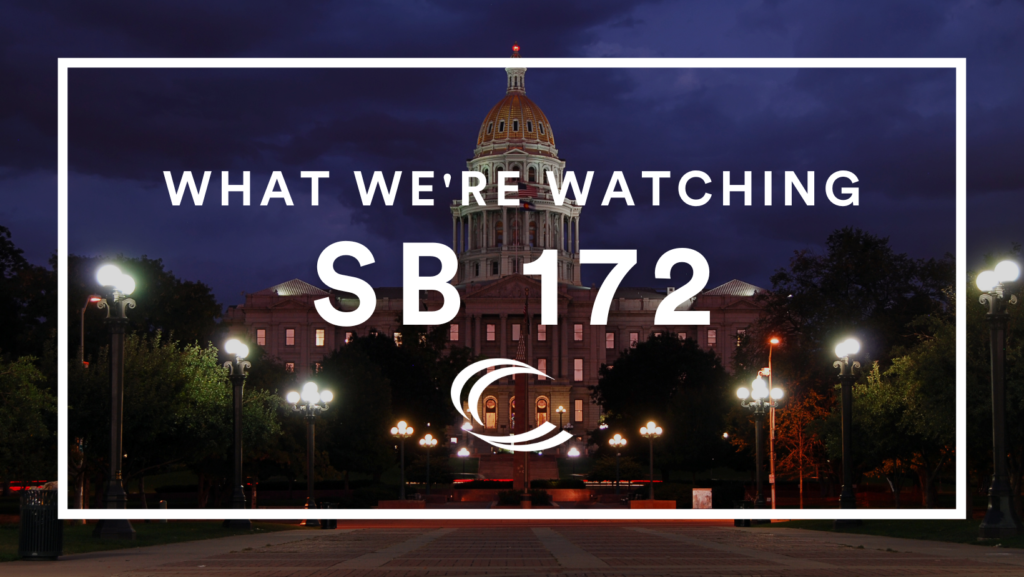In this Capitol Report:
What We’re Watching: The POWR Act – SB 172
Proposals in the 2023 legislative session have roughly a month left to pass through both chambers to have a chance at becoming law. This week, the Colorado Chamber is watching a long-anticipated revival of workplace harassment reform, SB 172, an issue the Chamber has worked closely on for the last three years.
A similar bill failed to pass the legislature in 2021 and 2022 after stalled negotiations between the business community and proponents over the definition of “harassment” under state law, among other issues. The Colorado Chamber’s lobby team worked extensively with the bill sponsors last year to strike a balance on the legislation to provide more clarity on the law while preventing unreasonable claims, but ultimately the 2022 bill created too broad of a new, untested legal standard. The sponsors withdrew the bill due to opposition from business and disability advocate groups.
Sens. Faith Winter and Julie Gonzales, sponsors of the 2023 bill, hope that the third time is a charm for SB 172, which was similar to previous iterations of the proposal as filed. The bill was heard in the state Senate Judiciary Committee Wednesday evening, and the Colorado Chamber’s President and CEO Loren Furman testified in opposition to the current version of the bill.
“We’ve demonstrated a commitment to try to find a path on this issue for the last three years,” Furman said in her testimony. “This would be a significant change to a legal standard that has been used by the courts for decades to determine whether behavior does rise to the level of harassment.”
Like its predecessors, the 2023 POWR Act seeks to broaden the current “severe and pervasive” standard for workplace harassment, which forms the basis for decades of legal precedent in Colorado courts. As introduced, the bill would have changed this definition to behavior that is “offensive to a reasonable person in the same actual or perceived protected class.” This definition was slightly narrowed in committee with amendments that exclude certain behaviors from the definition, such as minor annoyances or poor manners.
The Colorado Chamber and other industry groups have maintained their opposed position due to its potential to open the floodgates for frivolous litigation against employers.
Aubrey Elenis, director of the Colorado Civil Rights Division, also testified in opposition to the bill, sharing concerns about the new definition’s alignment with federal law. Elenis testified that the proposal could put the division’s work-share contracts in jeopardy.
A recent Colorado Civil Rights Division Report found that in 2021, more than 1,000 employment complaints were filed with the division. Of those complaints, only 26 were found to have probable cause while 424 were found to have no probable cause. The remainder were resolved through mediation, conciliation, were withdrawn, or went to court. This cost the division over $2 million in one year.
A recent fiscal note also found that the state’s civil rights division could see an increase in complaints of up to 25%, creating new costs and overwhelming division staff.
In her testimony, Furman also pointed to the fact that under the General Assembly’s own harassment policy at the capitol, which was recently updated in 2019, the “severe or pervasive” definition is still the standard for the conduct of legislators and staff. In a 2021 op-ed for Colorado Politics, Furman highlighted this discrepancy between the standards lawmakers have created for themselves and the standards set in the POWR Act.
Business groups aren’t the only ones concerned with the application of a new definition. As reported in The Sum & Substance, the Colorado Chamber’s digital news publication, a coalition of most of Colorado’s public universities have asked sponsors to exempt its members from the proposal due to the proposed definition conflicting with federal standards they already must comply with.
“If the legislature does choose to adopt a new standard, we believe it needs to be clear and it needs to avoid any kind of frivolous claims and expensive lawsuits that could be created,” Furman said in her testimony.
In addition to the definition of harassment, the Colorado Chamber testified to other problems with the proposed bill, including issues surrounding affirmative defense, recordkeeping and training requirements, and nondisclosure agreements. While several amendments were passed to try and address some of those concerns, they do not resolve the underlying concerns of the statewide business community. More details on how the bill was amended in committee can be found on The Sum & Substance.
SB 172 passed through the Judiciary Committee yesterday and will move on to appropriations, where the fiscal aspects of the bill will continue to be debated. Ultimately, while the Colorado Chamber appreciates the sponsors attempts to resolve employers’ issues with the bill, the amended version would still expose businesses to needless lawsuits and complaints, increasing litigation costs and making it more difficult to do business in Colorado. The Chamber will continue to work with legislators to find a compromise on the proposal.
“We are very committed to this process and discouraging harassment in the workplace,” Furman said to the Judiciary Committee. “But we need a law that accomplishes those goals instead of creating expensive lawsuits for all parties.”

